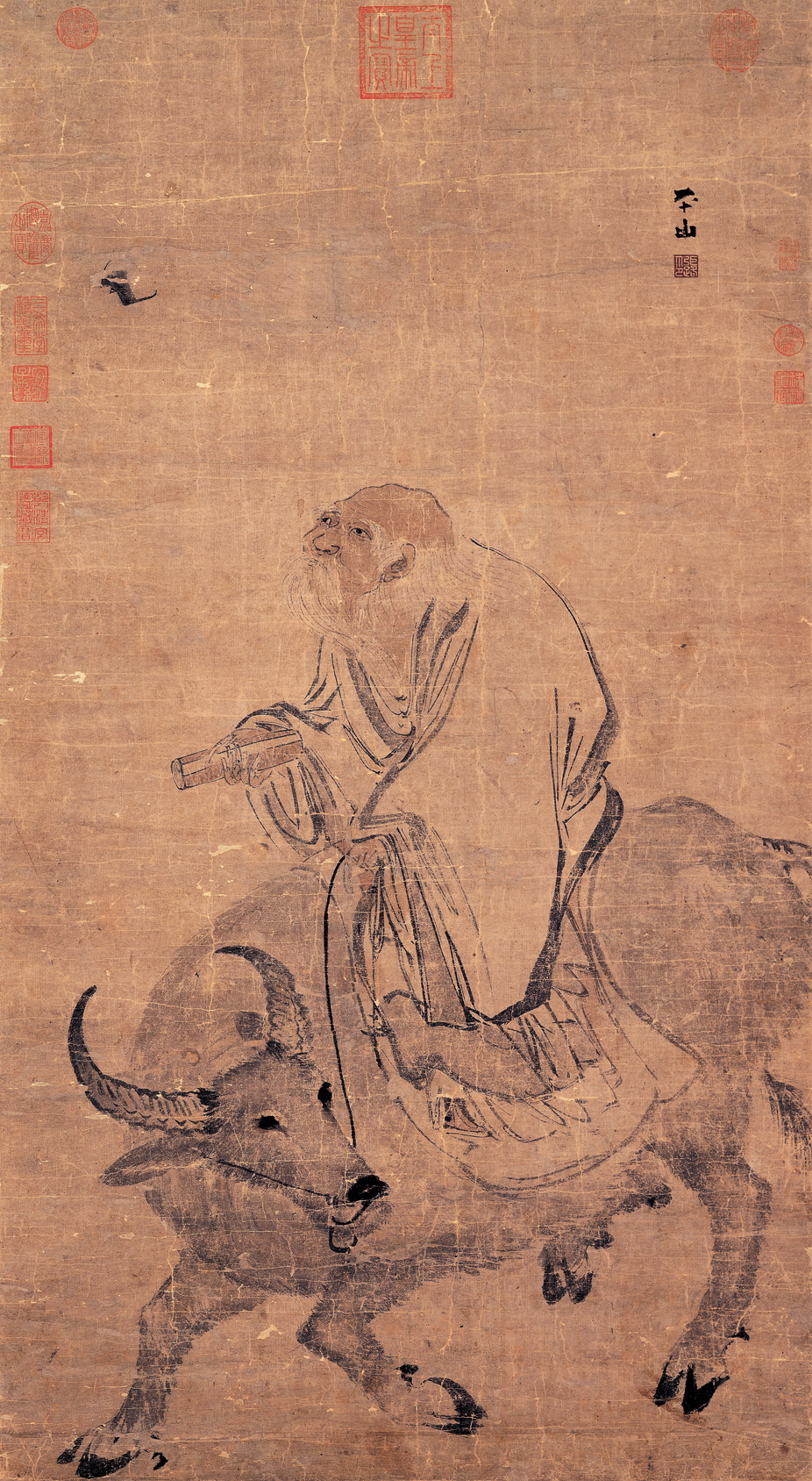3. Daoismens grundlæggende tekster
Uddrag af Daodejing
(1)
The Dao that can be followed is not the eternal Dao.
The name that can be named is not the eternal name.
The nameless is the origin of heaven and earth
(42)
The Dao produces one, one produces two.
The two produce the three and the three produce all things.
All things submit to yin and embrace yang.
They soften their energy to achieve harmony.
(2)
Presence and absence produce each other.
Difficulty and ease bring about each other.
Long and short delimit each other.
High and low rest on each other.
Sound and voice harmonize each other.
Front and back follow each other
(64)
Doing spoils it, grabbing misses it;
So the Wise Man refrains from doing
and doesn't spoil anything;
He grabs at nothing so never misses.
(57)
The more regulations there are,
The poorer people become.
The more people own lethal weapons,
The more darkened are the country and clans.
The more clever the people are,
The more extraordinary actions they take.
The more picky the laws are,
The more thieves and gangsters there are.
Therefore the sages say:
I do not force my Dao and the people transform themselves.
I enjoy my serenity and the people correct themselves.
I do not interfere and the people enrich themselves.
I have no desires
And the people find their original mind.
Oversat af Charles Muller
http://www.acmuller.net/con-dao/daodejing.html (02/09/2014).
(02/09/2014).
Nogle uddrag af Daodejing (omtrent ”Bogen om Vejen”). Det er en kort daoistisk tekst (omkring 5000 tegn), hvoraf nogle sektioner dateres helt tilbage til i hvert fald 400- og 300-tallet f.v.t. Dens originale titel var Laozi (omtrent ”Den Ærværdige Mesters Bog”), navngivet efter den pseudohistoriske Laozi (Mester Lao). Daodejing er nok den mest indflydelsesrige af alle tekster i hele daoismens historie.
Uddrag af Zhuangzi
2:8
The Perfect Man is godlike. Though the great swamps blaze, they cannot burn him; though the great rivers freeze, they cannot chill him; though swift lightning splits the hills and howling gales shake the sea, they cannot frighten him. A man like this rides the clouds and mist, straddles the sun and moon, and wanders beyond the four seas. Even life and death have no effect on him, much less the rules of profit and loss!"
18:2
Zhuangzi's wife died. When Huizi went to convey his condolences, he found Zhuangzi sitting with his legs sprawled out, pounding on a tub and singing. "You lived with her, she brought up your children and grew old," said Huizi. "It should be enough simply not to weep at her death. But pounding on a tub and singing - this is going too far, isn't it?"
Zhuangzi said, "You're wrong. When she first died, do you think I didn't grieve like anyone else? But I looked back to her beginning and the time before she was born. Not only the time before she was born, but the time before she had a body. Not only the time before she had a body, but the time before she was Qi. In the midst of the jumble of wonder and mystery a change took place and she was Qi. Another change and she had a body. Another change and she was born. Now there's been another change and she's dead. It's just like the progression of the four seasons, spring, summer, fall, winter.
"Now she's going to lie down peacefully in a vast room. If I were to follow after her bawling and sobbing, it would show that I don't understand anything about fate. So I stopped."
Oversættelse (let bearbejdet) af Burton Watson
http://terebess.hu/english/chuangtzu2.html (02/09/2014).
Nogle uddrag af Zhuangzi (”Mester Zhuangs Bog”), endnu en grundlæggende tekst, som har navn efter sin forfatter, Mester Zhuang. De ældste kapitler stammer fra slutningen af 300-tallet f.v.t., mens andre dele er et eller to århundreder senere.
Laozi ridende på en okse

”Laozi riding an Ox”
Hængende bogrulle
1500-tallet, Kina
Lys farve på papir
National Palace Museum, Beijing
Hentet fra:
http://commons.wikimedia.org/...Zhang_Lu-Laozi_Riding_an_Ox.jpg
(02/09/2014).
Public Domain
Et portræt af Laozi, den pseudohistoriske forfatter til Daodejing, ridende på en okse, mens han holder sit mesterværk i hånden.






